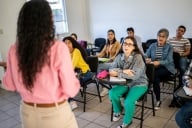You have /5 articles left.
Sign up for a free account or log in.

lechatnoir/E+/Getty Images
Last semester, I told my students to get lost. That is, I gave them an assignment that asked them to get lost on purpose, in the spirit of Guy Debord’s practice of the dérive, the radical act of drifting without an agenda in the hope of breaking free of habit.
Specifically, I asked them to use or create a deck—a collection of virtual or physical cards with tasks on them that can apply almost anywhere, like “trail a taxi down the street” or “go find something yellow”—to direct their dérive, alone or in a group. I instructed them to capture what they noticed while wandering, perhaps using a notebook or voice recordings, taking pictures or mapping their routes. Afterwards, referring to their field notes, I asked them to write reflection papers, thinking especially about how the experience changed—or didn’t change—their perception of the city.
What I thought would be a fun, interactive assignment that would get them thinking about their relation to their environment, disrupt their “usual motives”—as Debord would say—and challenge their assumptions about themselves turned out to be a very different kind of challenge: to actually get them to do it.
I was surprised and somewhat bemused when a number of students pushed back—not so much because they didn’t want to do the assignment, but because they were nervous about wandering around New York City. To be clear, I had encouraged them to do this with friends and, of course, to use their common sense and to prioritize safety above all else, but they remained anxious about the undertaking. In fact, one student, originally from the Caribbean, came to office hours to discuss the matter and ended up deciding that he would only feel comfortable doing the dérive when his uncle was in town from back home to accompany him. Apparently, this same student is driven to campus every day by his father.
Some of this will sound familiar—perhaps you’ve read similar accounts or had similar experiences with your own students. An article in Curbed from February last year reported on teenagers from the Upper East Side of Manhattan who rarely, if ever, leave the house alone now. Chaperoned by parents or bundled into Lyfts and Ubers, they are wholly different creatures from urban teenagers of the (not-so-distant) past, who reveled in an unsupervised life of sneaking down alleys, sauntering through parks, and skulking about on subways platforms. Writing in the Chronicle of Higher Education, Melinda Zook summarizes how the pandemic profoundly altered our young people.
Now out and about, they often find the world demanding and frightening. They may have missed certain milestones of adolescence, from getting a driver’s license and holding a summer job to opening a bank account. They date less than previous generations, giving them less opportunity to have their hearts broken, but also less chance to know the sweet sadness of love. Going somewhere, anywhere, without their parents knowing is often not part of their reality.
But whereas it might not come as a huge surprise that the children of rich Upper East Siders are coddled by their “super-overprotective” guardians (to quote one parent interviewed in the Curbed piece) who can afford a cab to college every day, mine are CUNY kids, attending a commuter institution in the City University of New York system. On top of their academics, they have full-time jobs and family responsibilities, and, in theory, anyway, they are part of a bigger world.
Nevertheless, they had reservations. They were cynical, they were resistant, they were put-upon, and they were just plain obstinate: “Going into this assignment I thought it was stupid. I assumed that I knew what I needed to know about the city since I lived here.” Their full and rigid schedules didn’t allow for such a seemingly frivolous exercise: “Partaking in this dérive challenged every structural thought that I follow on a day-to-day basis. My life is built on a list. Everything is laid out—all my plans for the day, all my goals and so on.”
And then they did it—because they had to—and were pleasantly surprised. They wrote, “I certainly did get lost, just not in the way I had anticipated,” and “I assumed that whatever I encountered would not be new and would bore me. However these assumptions were proven wrong. I stumbled upon a new part of the city that I had never been to, and I ended up discovering new things.”
While some of what they anticipated and assumed was proven wrong, their expectations were met in other ways. Alongside Debord, we read Garnette Cadogan’s essay “Walking While Black,” in which he reflects on the structural limits of his ability to simply drift as a person of color. A dérive is an avant-garde act—both because it disrupts the way we’re programmed to move through space habitually, and because the person doing it is aware of the markers of privilege such as class, gender, race and sexuality that allow for (or don’t) “the liberation of everyday life,” to again quote Debord. My students, attending a Hispanic and Minority Serving Institution, are always keenly aware of how they move through space, and this assignment affirmed that. They identified with Cadogan, as well as with Lucy, Jamaica Kincaid’s eponymous character, who we’d encountered earlier in the semester. Wrote one student:
“While there were women in the area, I was the only Black woman on the street for what felt like a long time. In New York City, you would think diversity would be everywhere you go, but I did not see that. Like Lucy, I felt like I was a visitor because I was Black. I relate to Lucy in this situation because it was as though I did not belong in this place full of wealth and prestige; not seeing any other people of color was almost confirmation that Wall Street and the area surrounding it was not meant for me … in a place that is supposed to be ‘my city.’”
Our students have been drifting away over the past few years. They have stopped coming to class, lost their connections with one another and turned to artificial intelligence (AI) to do their work. Even in this praxis-based, personal assignment, some students succumbed to the pull of AI and turned in generic descriptions and definitions.
Instead, we want them to drift back to the mindset that doing a dérive demands—being challenged and being challenging. In a way, their pushback befitted the assignment. This kind of drifting requires literally stepping out of your comfort zone in order to overturn what’s known and normal, to discover your curiosity and creativity, and to embrace the original sense of essay writing as just trying something out. At the end of her dérive essay, having let both her body and mind wander, one student wrote what we ultimately hope is true of all the discovery we want for our students: “I was surprised to remember that all of this started with a school assignment.”








